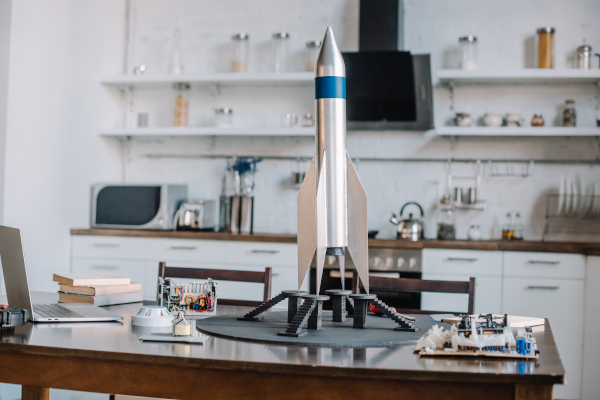The Short Report - May 24, 2023: Dal's ocean-first approach to combatting climate change; the first in-person training site for cell and gene therapies; the genomic monitoring of pathogens in water initiative, and more.

GOVERNMENT FUNDING NEWS
Dalhousie University, in conjunction with partner institutions Université du Québec à Rimouski, Université Laval, and Memorial University, has launched the Transforming Climate Action research program, aiming to position Canada as a global leader in climate science, innovation, and solutions. The program takes an ocean-first approach to combat climate change and received a $154-million investment from the Government of Canada through the Canada First Research Excellence Fund. Transforming Climate Action will focus on areas such as understanding the ocean's role in climate policy, carbon capture, and building equitable adaptation strategies. Dalhousie University
The Government of Canada has opened funding applications for industrial facilities under the Green Industrial Facilities and Manufacturing Program. The program, which has a budget of $194 million, aims to support industrial facilities in implementing energy efficiency projects and reducing greenhouse gas emissions. The program targets facilities seeking financial assistance for energy efficiency and energy management projects until March 2027, in order to increase competitiveness and meet global demand for low-carbon products. Natural Resources Canada
Genome British Columbia has announced the opening of a funding opportunity for researchers in British Columbia to address emerging pathogens and antimicrobial resistance. The Genomic Monitoring of Pathogens in Water initiative, supported by a $10-million investment from Genome Canada, will focus on genomic monitoring in water and promote collaboration across Canada to prepare for future pandemics and health challenges. The first component of the initiative, the C3 Hub, is accepting expressions of interest, and will act as a connector for data collection and informing public policy decisions. Interested researchers should register their interest by May 30th and can find details and application information on the Genome British Columbia website. Cision
Halifax-based space computation company Galaxia Mission Systems has received a $1.7-million contribution from the Canadian Space Agency to develop and launch MÖBIUS SDS, an advanced edge-computing platform, bringing computation and data storage closer to sources of data . The funding will support the construction and launch of GALAXIA's first two nano-satellite prototypes, which will take two years to build and one year for testing and will have applications in energy, infrastructure monitoring, and maritime security, among others. Galaxia says the platform is customizable and offers real-time data processing capabilities, enabling businesses to transform and leverage space data at an affordable and more efficient rate. GMS
The Saskatchewan Wheat Development Commission has allocated $1.6 million in funding over two years to eight research facilities known as the Saskatchewan AgriARM sites to continue to conduct research benefiting Saskatchewan farmers, such as studying the effects of urea ammonium nitrate on wheat protein and evaluating row spacing and seeding density. Each group will receive $200,000 to support extension services, purchase new equipment, and advance agronomic research. This investment aims to support the future of wheat production in Saskatchewan and allow AgriARM researchers to continue their work and share results across the province. Sask Wheat
The Government of Canada is investing $1 million in Guelph-based Bioimaging Research Solutions to support the development of an artificial intelligence (AI) system to enhance disease surveillance activities in abattoirs and protect Canadian livestock from bovine tuberculosis The investment will enable the company to develop an automated surveillance tool that uses machine learning algorithms to differentiate between healthy tissue and tissue of concern, thereby improving on current detection methods for the disease, which are time-consuming and not automated. This innovation also aims to improve disease detection efficiency and help maintain Canada's market access opportunities for beef and cattle exports. CFIA
COLLABORATION & INNOVATION
The U.S. Department of Energy and Canada’s Nuclear Waste Management Organization (NWMO) have signed a letter of intent to work together on the long-term storage of spent nuclear fuel. The agreement emphasizes information-sharing, scientific research, and best practices for managing nuclear waste, including from small modular reactors. The NWMO is currently in the process of selecting a site for Canada's deep geological repository to store nuclear waste underground. National Observer
RELATED: Taking a close look at the benefits and risks of small modular reactors
The Government of Canada is establishing a task force to clarify regulations for tidal energy projects in the Bay of Fundy. The task force aims to address industry frustrations and find solutions while ensuring fish species protection after UK-based Sustainable Marine Energy sought bankruptcy protection and blamed the government for its collapse. The task force, co-chaired by Natural Resources Canada, will focus on improving communication of environmental requirements and reducing approval turnaround times. CBC
The Government of Canada has launched a three-year pilot project as part of the Enhanced Nature Legacy program from Budget 2021 to encourage businesses to invest in biodiversity conservation. The Conservation Exchange Pilot provides a voluntary opportunity for businesses to contribute to nature conservation efforts, with those participating in the program receiving a certificate from Environment and Climate Change Canada to recognize their investments in nature. The pilot's initial projects include the restoration of the Amherst Point Salt Marsh in Nova Scotia, the MacKenzie Creek Restoration Project in Alberta, and precision conservation agriculture projects in Manitoba and Saskatchewan. ECCC| Backgrounder
The Université de Montréal and its two affiliated schools–Polytechnique Montréal and HEC Montréal–are establishing the Institut multidisciplinaire en cybersécurité et cyberrésilience (IMC2) to engage in cybersecurity research, training, and policy recommendations and to support the public and SMEs in responding to cybersecurity incidents. The institute will be made up of a multidisciplinary team consisting of 44 professors, their research teams, and students from fields such as information technology, criminology, and business. La Presse
The Canadian Advanced Therapies Training Institute (CATTI) has launched its first in-person training site at the University of Guelph as part of the first stage of a larger, multi-site training strategy through a partnership with Hamilton-based cell and gene therapy contract development and manufacturing organization OmniaBio, the Centre for Commercialization of Regenerative Medicine, and the university. The training program, set to begin in summer 2023, aims to address the talent requirements of the fast-growing cell and gene therapies (CGTs) industry by offering hands-on learning and focusing on training individuals in human pluripotent stem cell banking, aseptic techniques, and good manufacturing practices optimized for CGT manufacturing. Cision
The Canadian Food Inspection Agency (CFIA) is taking steps to address the presence of per- and polyfluoroalkyl substances (PFAS), commonly known as "forever chemicals," in biosolids used as commercial fertilizers. Currently, there are no standards for PFAS in biosolids in Canada, but the CFIA plans to implement an interim standard of less than 50 parts per billion of Perflurooctanesulfonic acid for domestic and imported biosolids to provide confidence to Canadian agricultural producers that imported products can be safely used on their fields. The CFIA will engage with stakeholders and provincial governments to develop an implementation plan and guidance for importers, producers, and commercial users of biosolids. Outcomes of the engagements will be concluded in the fall. CFIA
Meanwhile, the draft of the State of Per- and Polyfluoroalkyl Substances (PFAS) Report has been published, highlighting the potential harm PFAS's pose to both the environment and human health. The federal government is inviting Canadians and stakeholders to provide comments on the draft report to inform the development of the final report, which is intended to guide measures to reduce exposure and manage PFAS effectively. ECCC
Indigenous Services Canada is investing $10 million in new funding for community-based needs in relation to fire safety. The funding was announced during the inaugural First Nations First Responders Gathering held in Ottawa, where Indigenous fire protection and emergency responder leaders discussed topics such as fire protection legislation, wildland fire threats, and effective fire prevention strategies. The gathering also marked the release of the First Nations Fire Protection Strategy for 2023 to 2028, which aims to enhance fire safety through partnerships and modern technology. ISC
Canadian Nuclear Laboratories (CNL) has entered into a contribution agreement with the Canadian Space Agency (CSA) to develop and test materials that could enhance the safety and feasibility of long-term space travel. The $1- million project, funded through the CSA's Space Technology Development Program (STDP), aims to create strong, lightweight nanomaterials capable of withstanding extreme space conditions while providing radiation shielding. The project seeks to optimize the nanomaterials' shielding properties, mechanical strength, oxidation resistance, thermal stability, and low weight through modeling, experimentation, and rigorous testing. CNL
Meanwhile, Canadian Nuclear Laboratories, McMaster University, and Atomic Energy of Canada Limited have collaborated to launch the CNL Nuclear Undergraduate Research Experience program to provide undergraduate students at McMaster with hands-on work and research experience in the field of nuclear research, as well as to advance nuclear research, education, and training to meet the growing demand for a skilled workforce in the nuclear industry. Students from the faculties of engineering and science will develop research and technical skills in areas including small modular reactors, hydrogen, materials characterization, medical isotopes, and radiochemistry. The program includes mentorship opportunities with CNL employees and two weeks of hands-on research at CNL facilities. McMaster | CNL
Montreal-based video game developer studio Behaviour Interactive has made a $2 million gift to the Campaign for Concordia: Next-Gen Now that will support Concordia University's faculty of fine arts in developing new talent and fostering innovation in the video game industry. The funds will be used to establish a new research chair at the department of design and computation arts and provide financial assistance to undergraduate and graduate students pursuing careers in the field. Concordia
VC NEWS
Canadian venture capital (VC) investments in 2022 reached $9.42 billion, making it the second-best year for VC in Canada since 2017, according to financial intelligence provider CPE Analytics. Although there was a 33 percent decrease in disbursements compared to 2021, which was the best year for VC in Canadian history, 2022 still showed strong performance. The funding sources for Canadian companies included US and international investors, who contributed $4.24 billion and $1.70 billion, respectively, accounting for 45 percent and 18 percent of the total disbursements. Canadian investors contributed $3.49 billion, representing 37 percent of the total. Among other key findings of Canada's 2022 VC investments analysis:
- Canadian and non-Canadian VC investors combined invested $3.30 billion or 35 percent of the total disbursements. Specifically, Canadian, US, and international VCs invested $2.06 billion (22 percent), $972 million (10 percent), and $268 million (3 percent), respectively.
- Corporate investors, primarily from the US, invested a total of $2.44 billion (26 percent), with US, international, and Canadian corporations investing $1.15 billion, $831 million, and $454 million, respectively.
- Government investors contributed $780 million, with Canadian government investors accounting for $774 million (8 percent) of that amount.
- Ontario, Quebec, and British Columbia were the provinces that received the highest VC disbursements, with $3.5 billion, $2.45 billion, and $2.23 billion, respectively.
- Toronto, Montreal, and Vancouver were the leading municipal cities in terms of VC funding, receiving $2.49 billion, $2.1 billion, and $1.73 billion, respectively.
- The information technology sector received the largest share of VC funding, with $5.13 billion or 54 percent of the total disbursements. Cleantech companies secured $1.97 billion, surpassing biotech companies, which raised $1.14 billion.
Newswire
In the first quarter of 2023, Québec attracted more venture funding than any other Canadian region, despite a decline in investment compared to the previous quarter and year. Québec startups raised a total of $317.3 million through 12 deals, marking a 37 percent decrease in investment quarter-over-quarter and a 78 percent decline year-over-year. The Government of Québec played a significant role in supporting the ecosystem, with Investissement Québec, the investment arm of the provincial government, contributing to or leading half of the ten largest deals closed during the quarter. Beta Kit
THE GRAPEVINE
Minister of Innovation, Science and Industry François-Philippe Champagne and Minister of International Trade, Export Promotion, Small Business and Economic Development Mary Ng attended a two-day North American semiconductor conference in Washington, D.C. aimed at strengthening and securing the semiconductor supply chain in North America. The ministers also held a bilateral meeting with the United States Secretary of Commerce Gina Raimondo to discuss topics including semiconductors, supply chain resilience, critical minerals, and artificial intelligence. ISED
Member of Parliament Michelle Rempel Garner and Senator Colin Deacon have formed a parliamentary caucus group on emerging technology, to address concerns about the pace of technological advancement and its regulation. The cross-partisan working group intends to serve as a forum to link parliamentarians with stakeholders in various fields, including AI and blockchain, to educate and identify areas of consensus on government's role and policy objectives. Deacon emphasizes the need for closer collaboration between regulators and innovators to stay abreast of technological developments, as well as finding ways to increase agility in dealing with the opportunities and challenges the emerging technologies pose. Beta Kit
Michael Bitz will join the University of Ottawa as its new senior director of innovation support services on May 23, according to UOttawa's Associate Vice-President, Innovation, Partnerships and Entrepreneurship, Guy Levesque . Bitz has been with global development company Cowater International for the past 20 years as a public sector project expert. His career work includes experience in digital transformation, supporting modernization initiatives for governments in developing countries who were adopting IT solutions to support greater accountability and increased efficiency in public finance and other key administrative functions. Bitz also spent nearly a decade with Innovation, Science & Economic Development Canada as a senior policy advisor including its Canadian Intellectual Property Office. UOttawa
Simon Fraser University (SFU) has been named Canada's top university for innovation and industrial application in the 2023 World's Universities with Real Impact (WURI) rankings. SFU also ranked second in the world for entrepreneurial spirit. This marks the third consecutive year that SFU has topped the innovation category in Canada. The university has been focused on advancing its innovation ecosystem through SFU Innovates, its innovation strategy, and has seen success with spinoff companies like clean tech and advanced materials company Ionomr Innovations. SFU's 4D LABS and Big Data Hub were recognized as innovative research facilities in the rankings. SFU
Western University has indicated that it has no plans to terminate its research collaborations with China, despite concerns that such agreements may be exploited by Beijing. The university has disclosed that it is engaged in 16 joint-research projects with Chinese organizations, covering areas such as health, electronics, and the environment. While other Canadian universities, including the University of Waterloo, have ended their partnerships with Chinese tech giant Huawei due to security concerns, Western University has not specified if it has any partnerships with Huawei. The university is awaiting guidance from the federal government on entities that pose national security risks before making any decisions. CBC
R$
Events For Leaders in
Science, Tech, Innovation, and Policy
Discuss and learn from those in the know at our virtual and in-person events.
See Upcoming Events
You have 0 free articles remaining.
Don't miss out - start your free trial today.
Start your FREE trial Already a member? Log in
By using this website, you agree to our use of cookies. We use cookies to provide you with a great experience and to help our website run effectively in accordance with our Privacy Policy and Terms of Service.





